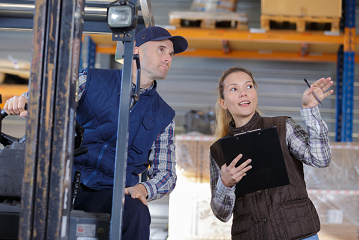Material Recording Clerk
Material Recording Clerk
Does this career fit your work personality?
Begin The Career Assessment Test- Best Fitting Careers
- Work Personality Strengths
- Work Style Preferences
- and more
Job Outlook
Overall employment of material recording clerks is projected to decline 4 percent from 2022 to 2032.
Despite declining employment, about 125,300 openings for material recording clerks are projected each year, on average, over the decade. All of those openings are expected to result from the need to replace workers who transfer to other occupations or exit the labor force, such as to retire.
What Material Recording Clerks Do
Material recording clerks track product information in order to keep businesses and supply chains on schedule. They ensure proper scheduling, recordkeeping, and inventory control.
Duties
Material recording clerks typically do the following:
- Keep records of items shipped, received, or transferred to another location
- Compile reports on various changes in production or inventory
- Organize the assembly, distribution, or delivery of goods to meet production schedules
- Prepare materials for shipping by labeling or checking packages
- Examine products for damage or defects
- Check inventory records for accuracy
Material recording clerks use computers or hand-held devices to keep track of inventory. Sensors and tags enable these electronic tools to automatically detect when and where products are moved, allowing clerks to keep updated reports without manually counting items.
The following are examples of types of material recording clerks:
Production, planning, and expediting clerks manage the flow of information, work, and materials within or among offices in a business. They compile reports on the progress of work and on any production problems that arise. These clerks set workers’ schedules, estimate costs, keep track of materials, and write special orders for new materials. They also do general office tasks, such as entering data or distributing mail. Expediting clerks maintain contact with vendors to ensure that supplies and equipment are shipped on time.
Shipping, receiving, and inventory clerks keep track of and record outgoing and incoming shipments. Clerks may scan barcodes with handheld devices or use radio frequency identification (RFID) scanners to keep track of inventory. They check to see whether shipment orders were processed correctly in their company’s computer system. They also compute freight costs, prepare invoices, and write inventory reports. Some clerks move goods from the warehouse to the loading dock.
Material and product inspecting clerks weigh, measure, check, sample, and keep records on materials, supplies, and equipment that enters a warehouse. They verify the quantity and quality of items they are assigned to examine, checking for defects and recording what they find. They use scales, counting devices, and calculators. Some decide what to do about a defective product, such as to scrap it or send it back to the factory to be repaired.

Work Environment

Material recording clerks held about 1.3 million jobs in 2022. Employment in the detailed occupations that make up material recording clerks was distributed as follows:
| Shipping, receiving, and inventory clerks | 862,900 |
| Production, planning, and expediting clerks | 396,800 |
| Weighers, measurers, checkers, and samplers, recordkeeping | 55,600 |
The largest employers of material recording clerks were as follows:
| Manufacturing | 27% |
| Retail trade | 17 |
| Wholesale trade | 14 |
| Transportation and warehousing | 14 |
| Temporary help services | 4 |
Material recording clerks usually work in an office inside a warehouse or manufacturing plant.
These workers also may spend time on the warehouse or plant floor to handle packages or automatic equipment, such as conveyor systems.
Injuries and Illnesses
Some material recording clerks may need to lift heavy items and to bend frequently, which may lead to injury. Using proper lifting techniques helps to reduce the risk of harm.
Work Schedules
Most material recording clerks work full time. Some work nights and weekends or holidays.
Getting Started
How to Become a Material Recording Clerk

Material recording clerks typically need a high school diploma or equivalent and are trained on the job.
Education
Material recording clerks typically need a high school diploma or equivalent.
Some employers prefer to hire production, planning, and expediting clerks who have a college degree.
Training
Material recording clerks usually learn on the job. Training for most material recording clerks lasts up to 1 month. Production, planning, and expediting clerks may train for up to 6 months.
Material recording clerks first may learn to count stock and mark inventory and then move on to more difficult tasks, such as recordkeeping. Production clerks first typically learn how their company operates before they write production and work schedules.
Workers learn safety rules as part of their training. Many of these rules are standardized through the Occupational Safety and Health Administration (OSHA).
Advancement
With additional training or education, material recording clerks may advance to other positions, such as purchasing agent, within their company.
Contacts for More Information
For more information about material recording clerks, visit
Warehousing Education and Research Council
Similar Occupations
This table shows a list of occupations with job duties that are similar to those of material recording clerks.
| Occupation | Job Duties | Entry-Level Education | Median Annual Pay, May 2022 | |
|---|---|---|---|---|

|
General Office Clerks |
General office clerks perform a variety of clerical tasks, including answering telephones, typing documents, and filing records. |
High school diploma or equivalent | $38,040 |

|
Hand Laborers and Material Movers |
Hand laborers and material movers manually move freight, stock, or other materials. |
See How to Become One | $34,960 |

|
Information Clerks |
Information clerks perform routine clerical duties, maintain records, collect data, and provide information to customers. |
See How to Become One | $38,710 |
